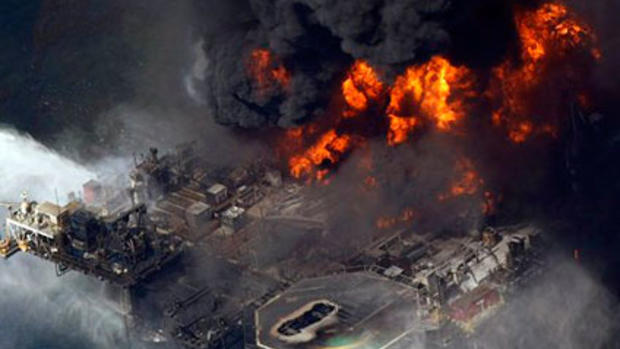Board: BP missed the big hazard issues in spill
(AP) HOUSTON - BP and the drilling contractor it hired to operate the ill-fated Deepwater Horizon focused too closely on workers' personal safety at the expense of preventing major hazards, such as those that ultimately caused the rig to blow up in the Gulf of Mexico in 2010, killing 11 people, federal investigators said Tuesday.
The preliminary findings were presented by the U.S. Chemical Safety and Hazard Investigation Board, a panel that often probes industry accidents but does not have regulatory authority.
The board said it had raised similar concerns after a deadly explosion in 2005 at BP's Texas City refinery, but discovered many of its recommendations had not been implemented on the offshore rig.
Study finds BP oil spill may have contributed to dolphin deaths
BP engineer indicted for alleged spill cover-up
Despite that failure, BP and Transocean received several commendations, including from a federal regulatory agency, for their safety records — awards that focused on injury and accident rates, but did not deal with well blowouts, fires, explosions or other major hazards.
Oil executives used similar examples to highlight the industry's safety record — even after the catastrophic blowout that caused the biggest offshore oil spill in U.S. history — an indication the entire industry is focusing too narrowly on personal safety issues, the investigators concluded in their 50-page Power Point presentation.
The panel found that the intense focus on personal safety has led to "complacency on major hazards," panel member Cheryl MacKenzie said.
BP, Transocean and the overall industry put an "overemphasis on personal safety at the expense of major hazard prevention," she added.
The board said there is a difference between worker safety and making sure the entire rig and well are safe, and the latter area is where BP and Transocean were "inadequate."
BP had the lease on the Macondo well, but the drilling rig was owned and operated by Transocean. The two companies have traded blame on what and who caused the accident.
"BP applied lesser process safety standards" to rigs contracted out than it did to its own facilities, safety board managing director Daniel Horowitz told The Associated Press in an interview. "In reality, both Transocean and BP dropped the ball on major accident hazards in this case."
In a statement emailed to the AP, BP said the company "stepped up" and developed more rigorous safety indicators following the accident.
The safety board said when BP looked at offshore endeavors it "focused on financial risks, not process safety risks." And after the Deepwater Horizon explosion, the company's own accident investigation report "recommended requiring hazard reviews of BP-owned and contracted rigs," the safety board's presentation says.
"That's very disturbing because the Gulf of Mexico belongs to the American people," said former Sen. Bob Graham, who co-chaired a different government oil spill investigation, one appointed by President Barack Obama.
"If that's true, it's reprehensible," Graham told The Associated Press on Monday night.
Congressional Democrats requested the safety board investigation. The panel usually investigates deadly industrial accidents and makes recommendations but has no power to regulate, much like the National Transportation Safety Board.
The panel has been criticized for its role in investigating the disaster. Transocean resisted complying with a subpoena arguing that the spill fell outside the board's jurisdiction, which covers industrial accidents onshore. An offshore rig is an ocean-going vessel that is motionless when drilling.
The board also had to push to gain access to examine the blowout preventer, and at one point demanded that the analysis stop, saying representatives of the companies that made and maintained the 300-ton device had been getting preferential and sometimes hands-on access to it.

